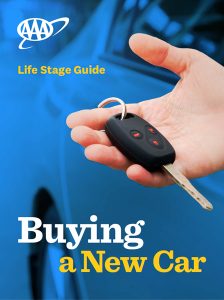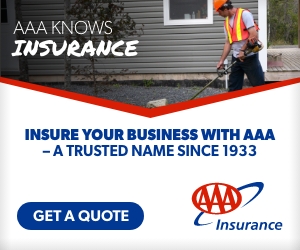Identity theft is one of the most common types of fraud affecting consumers today. After obtaining another’s personal information or data, thieves use it to rack up credit card charges, apply for documents and even transfer property. Besides the financial losses, victims face months of stress as they clear their names, change passwords and resecure their personal information.
The best way to protect yourself from identity theft scams is to safeguard your personal information and know what to look for. While identity theft methods are always evolving, there are a few common threads. One certainty: Scammers focus on easy targets.
Here are some identity theft ploys to be aware of and ways to protect yourself all year.
Take control of your identity with ProtectMyID® from AAA, fueled by Experian®. ProtectMyID Essential is free for AAA members.
Online Shopping Scams
Online shopping scams can consist of fraudulent websites, credit card fraud, gift card scams and hacking public Wi-Fi to get sensitive information. They are especially common during the holiday season when online shopping is at its height, and when shoppers typically overlook red flags.
How to avoid these scams: Always make purchases on secure Wi-Fi networks or use a virtual private network (VPN) when one isn’t available. Only shop from trusted and familiar retailers whose website URLs begin with “https” to indicate they securely encrypt your information. Review your accounts and statements regularly to ensure no fraudulent action has taken place. If you see an unfamiliar charge, report it to your bank immediately for dispute.
It’s generally safer to use credit cards rather than debit cards for online purchases since credit card purchases aren’t tied to your personal funds. And as an added measure of safety, avoid storing your credit card information on shopping websites. Manually entering your account information may feel like a chore, but it’s worth the extra effort. If you lose a device, a cybercriminal could have easy access to stored account details to make fraudulent purchases or sell your account information.
Learn how AAA members can save on Norton 360 subscriptions, which provide a password manager, real-time threat protection, cloud backups for your information, a secure VPN, dark web monitoring and more.
The Phishing Scam
This popular identity theft racket occurs when scammers send you an email disguised as a message from a legitimate business or organization in hopes that you will provide them with personal data such as account numbers, passwords or your Social Security number. These emails often are very cleverly crafted, using exact logos and return email addresses that seem legitimate.
How to avoid this scam: Never click through links on emails unless you know the sender. Never send secure personal data in an email. If a business claims it needs to confirm your personal information, close the email and log into your account through the official website to update your information. You may also want to contact the business to confirm it did not send the email and alert staff to a potential scam.
IRS Refunds and Winning Lottery Scams
You’ve heard the saying, “If it’s too good to be true, it probably is.” Keep this in mind when you get emails or phone calls suggesting that you’re about to be rich. Scammers will send out official-looking letters or emails with news of huge IRS refunds or lottery winnings – all you have to do is send them your bank account number so they can deposit the funds. Once criminals have your bank account number, they can do all kinds of financial damage.
How to avoid this scam: The IRS only will contact you with a letter sent to your home address. Never give your bank account number to anyone you don’t know.
Medical Identity Theft Scams
A thief can steal your personal information and use your identity to see doctors, obtain prescriptions or file claims with your health insurance provider. Not only does this scam cost insurance companies millions of dollars each year, but it could also affect your own medical records, treatment plans and possibly your credit score.
How to avoid this scam: Ensure that your doctor’s office keeps medical records in a secure area. Ask for an insurance card without your Social Security number on it. Read insurance and medical statements regularly for any signs of abnormal activity.

Confirming Your Information Scams
Scammers pose as officials from your bank or credit card company and ask for your account numbers, passwords or pin numbers in order to update their records. Sometimes they will ask for the three-or-four-digit security number from the back of your credit card. Calls or emails requesting this information should never be trusted.
How to avoid this scam: If you suspect a call is fraudulent, immediately ask for the person’s name and phone number. This may be enough to scare them off. Regardless, hang up the phone without giving them your personal data, and call your bank or credit card company right away.
How to Protect Yourself From an Identity Theft Scam
You can take steps to protect yourself and your loved ones from identity theft. Here are a few more tips to evade scammers.
- Never give out personal information over the phone or through email. If someone calls you claiming to be your doctor, bank, credit card company, etc., ask for their phone number and tell them that you will call them back later. If they suggest calling you back at a more convenient time, hang up, and immediately call the company and ask if they were trying to reach you.
- Keep tabs on your credit report. If your personal information has been stolen, you will almost definitely see signs of it in your credit report. Many credit cards offer credit report monitoring free of charge. You are also entitled to one free credit report annually from AnnualCreditReport.com.
- Report potential scams to the FTC. The Federal Trade Commission may not investigate every individual claim it receives, but it will document them to look for trends and signs of large-scale fraud. Use this link to file a fraud complaint with the FTC.
- Discuss identity theft with your family members. Children, teens and the elderly are the most vulnerable to identity theft scams. Discuss the latest scams with your family and remind them not to share their personal information with callers or over email.
Are you a small business owner? Don’t leave your business uncovered. Sign up for small business insurance with AAA.
Have you ever been the victim of an identity theft scam? Share your tips for avoiding scams in the comments.
28 Thoughts on “Identity Theft Scams to Keep an Eye On”
Leave A Comment
Comments are subject to moderation and may or may not be published at the editor’s discretion. Only comments that are relevant to the article and add value to the Your AAA community will be considered. Comments may be edited for clarity and length.

















I’m sorry I’m just reading this article now. This issue is so important, particularly for older people, to know. However, I’d be remised if I did not tell you there is another way your identity can be stolen. ln July 2019, without even realizing it for a year, someone filed a change of address card with the Post Office. They applied for car loans, bank loans, jobs, credit cards etc. just by changing my address so that they would receive all my mail. Seniors should be aware that this can happen too.
Tell them they are calling on a recorded line.
Tell them they are calling on a recorded line so can report them to the FCC
Today, within 3 hours, I got several calls from friends who reported that their email addressed from me, began by using my name to ask if I had an Amazon Prime account saying “hello ,( G my first name)-, there’s a question about your AmazonAaccount ” The scamers are busier than ever! Beware!
If you don’t need a loan or new credit cards, freeze your credit through the 3 credit reporting agencies. No one can open a new account in your name if there is a freeze
I’ve tried many times to get my free credit report. They all want my credit card number.
I don’t give that out in an email, so I have never seen my report and don’t know what it says about me
All of the credit reporting agencies have toll-free numbers so you can just call them and ask for your FREE credit report.
I get calls purportedly from Apple, and I always hang up because I don’t have a Mac. I’m the only one who uses the computer, so if someone calls saying “your computer needs repair,” my husband can truthfully say, “I don’t have a computer.”
We also get lots of calls from someone named “Amy” who says she’s from “medical services.” Funny, she never says which one…
And let’s not forget the “Grandma” scam, where they want you to send a money order to bail them out of jail! In that case I can politely (and truthfully) tell them that I’m no one’s grandma, and they must have the wrong number!
I get calls from “Visa”. Which bank, I ask. “Visa” is the answer. Which card, I ask. “Visa” is the answer. What is the number, I ask. “I only have access to part of the number” is the answer. What is it, I ask. “4” is the answer. Well, until you can tell me at least 4 digits (and I am not sure that is enough since the last 4 digits are used a LOT) and a bank name, I am not going to talk to you. And why would Visa be questioning a charge when a bank is willing to put it through? Not sure if this is a new scheme or just a variation of an old one.
I constantly receive phone calls telling me know how I can reduce the interest on my credit card. I press the number they give me and get connected to a live person. I say you can help me lower the interest on my credit card, how great because I do not have a credit card….click they hang up.
If you get a Facebook request that looks like it’s from a known friend, asking you to accept their new Instagram account so you can send messages to each other, ignore it or call your friend. If you accept, then they pose as your friend and try to get personal financial info by telling you to contact so-and-so for a “caregiver grant” or something they tell you they had received. Do not contact them and do not open the Instagram account.
I’m pretty good about this issue, but not perfect. Unfortunately, it only takes one mistake. I found this article to be an excellent reminder.
I mark all of my credit cards on the signature line with “ASK FOR ID” instead of my name. Then I hold up my ID for them to see. No one ever looks at the ID so I have to ask them to do so. This raises their awareness to credit card fraud. My newest CC does not require a signature. I still show them my ID to raise their awareness.
I do the same. NOBODY ever checks!
I have heard of scams where the caller will say they are calling you on a recorded line and ask if you can hear them. The intent is to have you say “yes” and that can be used as your acceptance of the offer. I personally reply “the volume is good” and the caller disconnects.
Years ago I googled Microsoft help and got a phony who wanted to access my screen to help me. HANG UP
Here’s a scam you did not mention. Someone will call and ask “Is this____?” If you answer “yes” they can take that answer, record it and use it with your voice to make a purchase, enroll in something or otherwise try to scam you. The answer to that question should be “Who are you?” “Why are you asking?” or simply hang up.
Here’s another one: You get an email thanking you for allowing someone to use your credit card to renew a subscription or for signing up for something. You know you didn’t sign up for anything, so you call the number provided which turns out to be in India somewhere. Hang up immediately!
You can also say, “Speaking – how can I help you?” I agree, under NO circumstances should you say “yes.”
Another twist is a call notifying you that a certain $ amount is being charged to your account (they reference Amazon specifically; I’m sure because it’s so widely used) and they leave a voice mail telling you that a charge of $ 599.23 (amount changes each time they call) has been processed against your account, and if you want to contest it, call……….. Ignore it.
I got this one – several times in one day from different phone numbers. Since they did not know my account number, and nothing showed up on my Amazon account which I accessed while talking to them, I asked how they knew which account was being charged, (I made like I had several accounts) and they kept trying to get me to give them the numbers. How can they call about a charge on the account when they don’t know what account is being charged? They could never answer that question.
I take advantage of the scammer and keep them on the phone as long as I can. This way they cannot make another call while I flip the script. I keep pulling in the the line until they realize that I know I am playing with them. It can be a great way to foul them up!
This sounds like fun! And you might be preventing someone from being scammed.
You cannot win a contest or lottery, etc. you never entered.
If they keep saying your credit card without mentioning the particular card VISA MC, etc., it’s a fake.
If an extended warranty company cannot tell you what make and model car you own, it is also a scam. Or you can just play dumb and say you don’t have a credit card or own a car.
I had someone supposedly calling from Amazon to tell me about a possible fraudulent charge posted on my credit card, but I ‘smelled a rat’ when the scammer didn’t even ask my name to verify who he was talking to!
I was getting repeated calls from different numbers claiming that I owed hundreds of dollars for a a computer monitoring and repair service. I made the mistake of trying to talk to one of the callers, and he would call again 3-4 times a day, offering me discounts if I would address the “bill.” I finally had to LITERALLY shout at him that I knew this was a fraud and was reporting his numbers to the State Attorney General’s Fraud hotline, and it stopped.
“You are also entitled to one free credit report annually from AnnualCreditReport.com.”
Actually, you are entitled to THREE free credit reports – one each from Equifax, Experian, and TransUnion. A smart strategy is to request them four months apart; while some items may only appear on one of the reports, staggering them this way will increase your chances of catching fraud as early as possible.
I have set annual reminders on my computer, so I don’t even have to remember the dates!
Thank you so much for this information! Much appreciated!
Hi Barry: I received a long winded threat. If I don’t contact them, they will start their “Law Of Suit”. Some times these calls are SO RIDICULOUS!
Thanks for your article. Judy